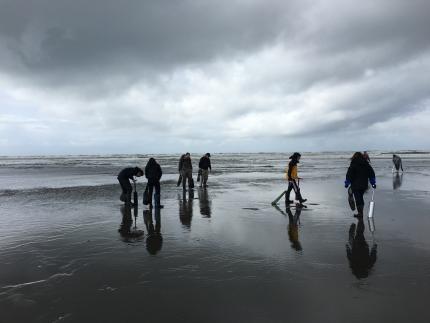ARCHIVED NEWS RELEASE
This document is provided for archival purposes only. Archived documents
do not reflect current WDFW regulations or policy and may contain factual
inaccuracies.
News release Jan. 20, 2023
Contact: Dan Ayres, 360-249-4628
Media contact: Mark Yuasa, 360-902-2262

Washington Department of Fish and Wildlife (WDFW) today shellfish managers confirmed razor clam digging reopens at Copalis Beach only on Saturday, Jan. 21, followed by additional opportunities on Jan. 23 and Jan. 25.
“We know this is short notice but promised to open any beach as soon as we had good results and those able participate will have some excellent digging,” said Dan Ayres, WDFW coastal shellfish manager. “We’ll continue to closely monitor toxin levels in razor clams and hope to get Long Beach, Twin Harbors and Mocrocks reopened as soon as clams are safe to eat.”
The following digs during evening (p.m.) low tides will proceed as scheduled:
- Jan. 21, Saturday, 6:23 p.m.; -1.8 feet; Copalis only
- Jan. 23, Monday, 7:52 p.m.; -1.6 feet; Copalis only
- Jan. 25, Wednesday, 9:16 p.m.; -0.2 feet; Copalis only
The Washington Department of Health (WDOH) labs indicate domoic acid levels at Long Beach, Twin Harbors, and Mocrocks beaches were still above the health guideline levels.
Domoic acid, a natural toxin produced by certain types of marine algae, can be harmful or fatal if consumed in sufficient quantities. WDFW shellfish staff will continue to regularly dig test samples of razor clams to monitor the situation. The WDOH requires two test samples taken 10 days apart, must fall under the health guideline level before a beach can reopen for razor clam digging.
WDFW will announce future digging opportunities when marine toxin tests show it is safe to do so. More information about domoic acid, as well as current levels at ocean beaches, can be found on WDFW's domoic acid webpage.
The daily limit is 15 razor clams per person. Under state law, a daily limit consists of the first 15 clams dug regardless of size or condition, and each digger’s clams must be kept in a separate container. Digging is prohibited in the razor clam reserve located just south of the Ocean City approach on Copalis, which are marked by 10-foot poles with signs. The most successful digging occurs between one and two hours before the listed time of low tide.
All diggers age 15 or older must have an applicable fishing license to harvest razor clams on any beach. Licenses may be purchased on WDFW’s licensing website, and from hundreds of license vendors around the state. WDFW recommends buying your license before visiting coastal beach communities.
For additional details, go to the WDFW's razor clam webpage and the DOH webpage. To be notified of in-season rule changes as they are announced sign up for email notifications at wdfw.wa.gov/about/lists.
The Washington Department of Fish and Wildlife works to preserve, protect, and perpetuate fish, wildlife and ecosystems while providing sustainable fish and wildlife recreational and commercial opportunities.